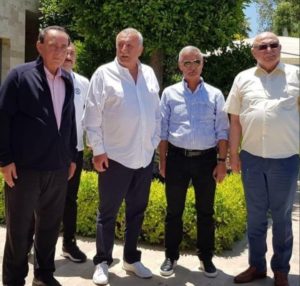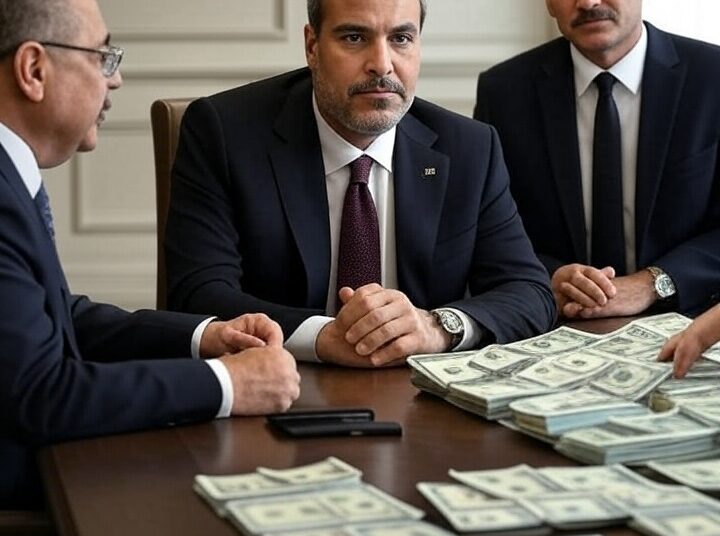Abdullah Bozkurt/ Stockholm
A major US federal criminal complaint has revealed a vast methamphetamine trafficking scheme with significant ties to Turkey, naming a Turkish national as a key conduit in a sprawling drug network that spans Mexico, the US, Canada, Australia, New Zealand and Africa.
The complaint further confirms how Turkey — under the increasingly authoritarian and corrupt rule of President Recep Tayyip Erdoğan — has become a key hub for global narcotics trafficking. Known drug traffickers continue to operate in Turkey with impunity, protected by political connections, an extensive bribery network and lax law enforcement oversight.
Filed first in the US District Court for the Central District of California in February 2024 and transferred in June 2025 to the US District Court for the District of Nevada, the affidavit outlines an international drug operation led by Canadian national Opinder Singh Sian, also known by the aliases “Cain,” “Thanos” and “Opie.” Sian was arrested for conspiring to export large quantities of methamphetamine, with Turkish trafficker Ibrahim Özçelik playing a critical role in linking North American operations with networks on other continents.
The investigation, launched in June 2022, was initiated after the US Drug Enforcement Administration (DEA) received intelligence from its Ankara country office, which had been investigating a transnational drug trafficking organization that included senior figures based in Turkey.
According to the DEA, the network coordinated major shipments of narcotics from South America and Mexico to the US for further distribution to Canada, Europe, Australia and New Zealand. Turkish operatives sought assistance in moving drugs through Southern California ports to these destinations.
A US complaint on major drug trafficking involving Turkey and Turkish operatives:
Özçelik, identified as a member of the drug trafficking organization (DTO) operating from Turkey, was one of the first to contact a DEA informant — referred to as CS-1 in the complaint — posing as a global logistics facilitator. Özçelik introduced CS-1 to Sian, who orchestrated methamphetamine shipments from the Los Angeles area to Australia.
These shipments, totaling over 200 kilograms of high-purity meth, were intercepted and replaced with dummy packages in coordination with Australian authorities, enabling law enforcement to track and arrest recipients in Sydney.
The complaint also names another Turkish national, Hakan Arif — dubbed a “known drug kingpin” — as one of Sian’s main suppliers. Sian allegedly bragged about working with Arif and transporting tons of narcotics, including shipments to Africa for redistribution.
Sian’s meetings with CS-1 in Vancouver shed further light on the scale of the operation. He claimed collaboration with Irish, Italian and Canadian organized crime groups and noted receiving large drug shipments from Özçelik in Turkey without upfront payment — indicating deep trust and high-volume transactions.
The affidavit also details efforts by Sian and his associates to traffic fentanyl precursors from China into the US, with Özçelik allegedly facilitating logistics through Africa. CS-1 received fentanyl samples by mail and met with suppliers tied to Chinese and Vietnamese criminal networks operating in Canada.
Despite longstanding denials by the Erdoğan government, this investigation adds to the growing body of evidence that Turkey has become a central node in global narcotics trafficking — enabled by systemic corruption, political protection, weak border controls, a corrupt police and judiciary and opaque financial structures.
Key figures involved in drug trafficking through Turkey are closely linked to the Erdogan government and its political partner, the far-right Nationalist Movement Party (MHP). The MHP — long associated with mafia groups and criminal networks — wields significant influence in Turkey’s judiciary and law enforcement, offering political protection and impunity to traffickers.

Between 2014 and 2017, the Erdoğan government purged tens of thousands of senior officers from the police, military, judiciary and intelligence services under various pretexts, replacing experienced personnel with political loyalists and partisans. As a result of these sweeping purges, criminal investigations into drug trafficking networks, Turkey’s illegal arms shipments to jihadist groups in Syria and clandestine efforts to undermine the sanctions regime on Iran were all shut down by the Erdoğan government.
What’s more, the Erdogan government and MHP-controlled parliament have enacted new legislation designed to facilitate the release of high-profile criminal figures. For example, mob boss Alaattin Çakıcı — convicted of multiple murders — was released from prison in 2020. His political patron, MHP leader Devlet Bahçeli, publicly praised him as a “patriot,” framing his crimes as acts of service to the state.
Çakıcı has been operating along with Mehmet Ağar, a former interior minister who is believed to have overseen criminal syndicates on behalf of Erdoğan’s government.
The case of Halil Falyalı, a notorious drug trafficker based in Turkish-occupied northern Cyprus and indicted by US authorities in 2015, offers another example. Despite facing arrest warrants for drug trafficking and money laundering, Falyalı operated freely until his assassination on February 8, 2022, in what is believed to have been an internal power struggle.

Cemil Önal, the Falyalı family’s accountant from 2014 to 2021, played a central role in laundering illicit proceeds and later revealed that tens of millions of dollars in bribes were paid to top Turkish officials. These bribes were allegedly funneled through intermediaries to Foreign Minister Hakan Fidan (then head of Turkish intelligence), former vice president Fuat Oktay, former interior minister Süleyman Soylu and ruling AKP spokesperson Ömer Çelik, a close Erdogan confidant.
Önal was assassinated in the Netherlands on May 1, likely by Turkish operatives aiming to silence him and prevent further revelations implicating senior Turkish officials and the criminal networks operating from Turkey and Cyprus.
Turkey’s security institutions — including the national police, gendarmerie, and intelligence agency MIT — have also been implicated in facilitating drug routes. While the Erdogan government has promoted drug busts as evidence of its anti-crime stance, most operations have led only to the arrest of low-level dealers. Senior operatives and masterminds have largely escaped justice.
Known international traffickers have flocked to Turkey in recent years, many acquiring Turkish citizenship and new identities, even while under INTERPOL Red Notices. Despite official vetting procedures that should have triggered red flags, Turkish authorities have approved residence and citizenship applications for these fugitives.
In rare cases where the Erdogan government has acted, it was usually under international pressure. Even then, Turkish collaborators who helped traffickers settle, launder money and manage logistics have not faced consequences.
This US indictment underscores increasing global scrutiny of Turkey and Turkish nationals involved in organized narcotics. It raises serious concerns about Ankara’s willingness to confront the problem, as Turkish operatives continue to coordinate with global cartels from within the country without consequence.












